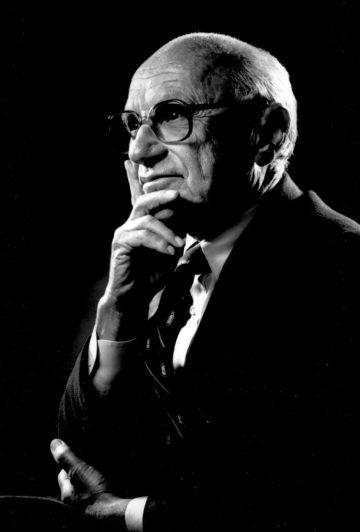

See I grew into a classical liberal/libertarian movement where all my elders were influenced either by The Road to Serfdom (1944), or Capitalism and Freedom (1962) well before they ever read Free to Choose (1980).

Instead, I want to ask readers to think of a different question. I am not going to dispute the vital importance of the climate of opinion and how politics is shaped within the constraints of the prevailing ideological climate to a considerable extent. This might even be Friedman’s preferred explanation as it is consistent with the “tide of ideas” approach to social change. One way to make this claim is to suggest that Capitalism and Freedom was so successful at influencing thought leaders that by the time Free to Choose was published the intellectual elite was more receptive to the ideas. Among economists of a certain generation, they find Capitalism and Freedom the more tightly reasoned book, and explain the impact difference on a general shift of the climate of opinion. But Free to Choose was an international sensation when it was published in 1980. Read, Dec.Capitalism and Freedom was published in 1962 without much fanfare, though it has since stood the test of time. Introduction: “I, Pencil: My Family Tree” as told to Leonard E.
 Author: BOLL 17: Milton Friedman, “Capitalism and Freedom” (1961). Watch the OLL Video The Intellectual Portrait Series: A Conversation with Milton Friedman the Concise Encyclopedia of Economics entry on Friedman. Milton Friedman on Money (28 August 2006). Friedman on Capitalism and Freedom (4 Sept 2006). See also the following podcasts on our sister website Econtalk: Friedman) Tyranny of the Status Quo (Harcourt Brace Jovanovich, 1984). Friedman) Free to Choose (Harcourt Brace Jovanovich, 1980), and (with Rose D. Friedman) Capitalism and Freedom (University of Chicago Press, 1962) Bright Promises, Dismal Performance (Thomas Horton and Daughters, 1983), which consists mostly of reprints of columns he wrote for Newsweek from 1966 to 1983 (with Rose D. His most important books in this field are (with Rose D. Friedman has also written extensively on public policy, always with a primary emphasis on the preservation and extension of individual freedom. Schwartz) A Monetary History of the United States, Monetary Statistics of the United States, and Monetary Trends in the United States and the United Kingdom. Milton Friedman (1912-2007) is the author of many books and articles in economics, including A Theory of the Consumption Function, The Optimum Quantity of Money and Other Essays, and (with A. Historical Period: The 20th Century and Beyond
Author: BOLL 17: Milton Friedman, “Capitalism and Freedom” (1961). Watch the OLL Video The Intellectual Portrait Series: A Conversation with Milton Friedman the Concise Encyclopedia of Economics entry on Friedman. Milton Friedman on Money (28 August 2006). Friedman on Capitalism and Freedom (4 Sept 2006). See also the following podcasts on our sister website Econtalk: Friedman) Tyranny of the Status Quo (Harcourt Brace Jovanovich, 1984). Friedman) Free to Choose (Harcourt Brace Jovanovich, 1980), and (with Rose D. Friedman) Capitalism and Freedom (University of Chicago Press, 1962) Bright Promises, Dismal Performance (Thomas Horton and Daughters, 1983), which consists mostly of reprints of columns he wrote for Newsweek from 1966 to 1983 (with Rose D. His most important books in this field are (with Rose D. Friedman has also written extensively on public policy, always with a primary emphasis on the preservation and extension of individual freedom. Schwartz) A Monetary History of the United States, Monetary Statistics of the United States, and Monetary Trends in the United States and the United Kingdom. Milton Friedman (1912-2007) is the author of many books and articles in economics, including A Theory of the Consumption Function, The Optimum Quantity of Money and Other Essays, and (with A. Historical Period: The 20th Century and Beyond







 0 kommentar(er)
0 kommentar(er)
